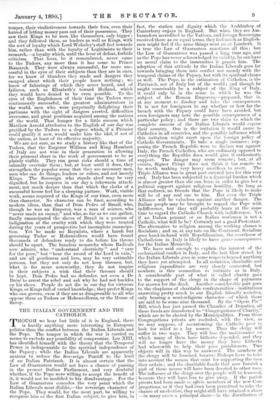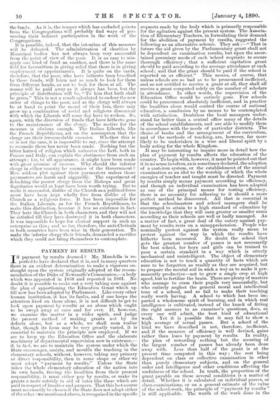THE ITALIAN GOVERNMENT AND THE CATHOLICS. T HOUGH we hear but
little of it in England, there is hardly anything more interesting in European politics than the conflict between the Italian Liberals and the Pope. The temper in which the war is carried on seems to exclude any possibility of compromise. Leo XIII. has identified himself with the theory that the Temporal Power is indispensable to the spiritual independence of the Papacy ; while the Italian Liberals are apparently anxious to reduce the Sovereign Pontiff to the level of an Italian Patriarch. It is almost certain that the Law of Guarantees would not have a chance of passing in the present Italian Parliament, and very doubtful whether, if the Pope were willing to accept the benefit of it, it would not be modified to his disadvantage. For the Law of Guarantees concedes the very point which the Italian Liberals most dislike,—the sovereign character of the Pope. They would, for the most part, be willing to recognise him as the first Italian subject, to give him, in fact, the station and dignity which the Archbishop of Canterbury enjoys in England. But when they see Am- bassadors accredited to the Vatican, and foreign Sovereigns received there as on equal terms, they feel much as English- men might feel if the same things went on at Lambeth. It is true the Law of Guarantees sanctions all this ; but the Law of Guarantees was passed a long time ago, and as the Pope has never acknowledged its validity, he can have no moral claim to the immunities it grants him. The adoption of this attitude by the Italian Liberals goes far towards bringing them into conflict not merely with the temporal claims of the Papacy, but with its spiritual claims as well. The Pope, in the estimation of Catholics, is the Patriarch, not of Italy but of the world ; and though he might conceivably be a subject of the King of Italy, it could only be in the sense in which he was the subject of the Roman Emperors,—prepared, that is, at any moment to disobey and take the consequences. It is not for foreigners to say whether or how far the breach with the Papacy could have been avoided, but even foreigners may note the possible consequences of a particular policy ; and there are two risks to which the complete success of the Italian Liberals would expose their country. One is the irritation it would cause to Catholics in all countries, and the possible influence which this irritation might exert upon the foreign policy of Catholic Governments. To take a single instance : sup- posing the French Republic were to declare war against Italy, the French Catholics, who are ordinarily opposed to everything the Republic does, would give it enthusiastic support. The danger may seem remote ; but, at all events, Signor Crispi does not think it too remote to be worth making very heavy sacrifices to avert. The Triple Alliance was in great part entered into for this very end. Italy has been subjected to a financial burden which is almost greater than she can bear, in order to give her a political support against religious hostility. So long as that endures, no friends that the Pope is likely to make will be of any real use to him. But even the Triple Alliance will be valueless against another danger. The Italian people may be brought to regard the Pope with indifference, but they will probably learn at the same time to regard the Catholic Church with indifference. Yet if an Italian peasant or an Italian workman is not a Catholic, what will he be? Certainly not a good Protestant. The alternative to religion among the working classes is Socialism ; and as, at any rate on the Continent, Socialism goes hand-in-hand with Republicanism, the overthrow of Catholicism in Italy is likely to have grave consequences for the Italian Monarchy.
We have said enough to explain the interest of the ecclesiastical conflict in Italy, and the last blow struck by the Italian Liberals goes in some respects beyond anything they have yet attempted. In all countries, charitable and religious expenditure are very closely connected, but nowhere is this connection so intimate as in Italy. A considerable part of what is called charity goes to the support of the clergy in the shape of payments for masses for the dead. Another considerable part goes to the chaplains of charitable confraternities—institutions answering pretty much to our English friendly societies, only bearing a semi-religious character—of which there are said to be some nine thousand. By the " Opere Pie " Bill, which has just passed the Chamber of Deputies, all these funds are transferred to " Congregations of Charity," which are to be elected by the Municipalities. From these Congregations priests are excluded, with the view, as we may suppose, of accustoming the Catholic poor to look for relief to a lay source. Thus the clergy will suffer in two ways. They will lose the maintenance on which many of them have hitherto depended, and they will no longer have the money they have hitherto had wherewith to help their poor parishioners. Two objects will in this way be answered. The numbers of the clergy will be lessened, because Bishops have to take into account the means that exist for supporting the men they ordain ; and the charitable funds that now furnish a part of these means will have been devoted to other uses. The influence of the clergy over the people will be lessened, because they will have less to give away. If the parish priests had been made ex officio members of the new Con- gregations, or if they had even been permitted to take the chance of an election, they might still have retained a share —in many cases a principal share—in the distribution of the funds. As it is, the temper which has excluded priests from the Congregations will probably find ways of pre- venting their indirect participation in the work of the Congregations. It is possible, indeed, that the intention of this measure will be defeated. The administration of charities by Municipal bodies has not always beep very successful from the point of view of the poor. It is as easy to mis- apply one kind of fund as another, and there is the same field for favouritism in giving relief that there is in giving employment or appointments. It is quite on the cards, therefore, that the poor, who have hitherto been benefited by these funds, will learn not so much to look for them from different hands, as not to look for them at all. The money will be paid away as it always has been, but the principle of distribution will be, " To him that hath shall be given." This is not a result calculated to endear the new order of things to the poor, and as the clergy will always be at hand to point the moral of their loss, there may grow up a combination of social and religious discontent with which the Liberals will some day have to reckon. So, again, with the diversion of funds that have hitherto gone to the maintenance of the clergy. The motive for the measure is obvious enough. The Italian Liberals, like the French Republicans, act on the assumption that the clergy are their irreconcilable enemies. Whether this is or is not the case, it is impossible to say, since the attempt to reconcile them has never been made. Nothing but the bitter hatred of religion which animates the Left, both in France and Italy, can explain the abstinence from such an attempt ; for, to all appearance, it might have been ma de with great promise of success. Why should the inferior clergy in either country be enemies of the Government ? Men seldom plot against their paymasters unless those paymasters are harsh and niggardly. The experiment of detaching the poorer clergy from the Bishops and great dignitaries would at least have been worth trying. But to make it successful, dislike of the Church as a political force must have been kept wholly free from dislike of the Church as a religious force. It has been impossible for the Italian Liberals, as for the French Republicans, to make this distinction, because it has no existence in fact. They hate the Church in both characters, and they will not be satisfied till they have destroyed it in both characters. It was impossible to hope for clerical support in such an enterprise as this ; and so far, therefore, the anti-Clericals in both countries have been wise in their generation. To make the inferior clergy their friends, demanded a sacrifice which they could not bring themselves to contemplate.















































 Previous page
Previous page